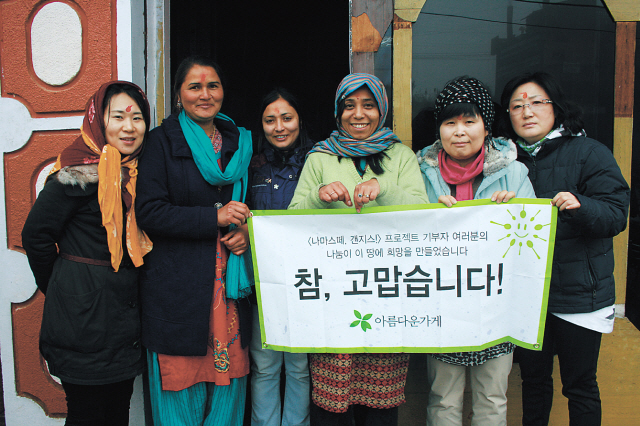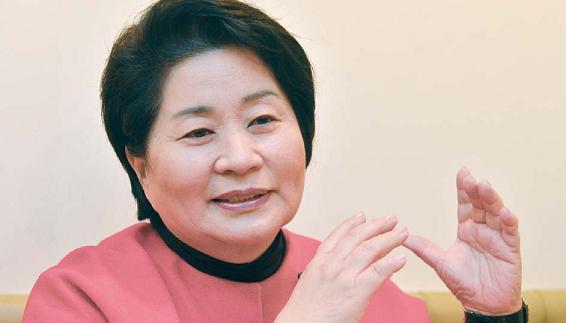A growing number of entrepreneurs are jumping on social businesses that help the poor and socially vulnerable by creating jobs and returning profits.
But devotion and hard work are not enough. Even with government support, many social enterprises in Korea have folded after failing to find a sustainable financial model and firm trust from the public.
“Entrepreneurship is prerequisite to achieving success. Social enterprises should become financially independent first to carry on their will aimed at making contributions to society. Good will is not enough,” Hong Myung-hee, chairperson of Beautiful Store, one of the nation’s first social enterprises, told The Korea Herald.
Unlike traditional charity organizations, social enterprises make profits and then provide public goods.
Beautiful Store generated about 20 billion won ($18.4 million) in revenue last year, mostly from the sale of recycled goods donated to its branches and fair trade projects such as importing organic coffee and chocolates from Nepal, Peru and Uganda.

Three Nepalese recipients (second from left) of donations by Beautiful Store holds a banner with officials from the social firm that reads “Thank you very much” in 2011. (Beautiful Store)
Making profits each year, it spent more than 22 billion won over the last 10 years on those in need both in Korea and overseas.
It has cultivated its own business model by benchmarking its 400 partner firms, learning their business practices from accounting and data processing to human resources, she said.
Building public trust is also important. “The success of Beautiful Store was possible because it promoted transparency in management and applied high ethical standards to its operation,” she said. Research by TNS Korea showed that 62 percent of Koreans recognize Beautiful Store as a social enterprise.
Hong warned that social enterprises shouldn’t rely on government support. The Ministry of Labor offers temporary tax exemption and covers labor expenses for social enterprises for three years.
“The government needs to consider offering other types of support that help firms develop new ideas and provide marketing consultants to test their market value.”

Hong Myung-hee, chairperson of Beautiful Store, talks about running a social firm in Korea. (Lee Sang-sub/The Korea Herald)
From a business perspective, Beautiful Store is a logistics company that generates profit by moving products from one place to another. But having just one business model is dangerous in terms of keeping the organization financially healthy, particularly by collecting personal donations on a non-regular basis. So, the organization plans to expand business overseas and develop new products to achieve sustainable business.
“Beautiful Store is now just a shop that sells recycled products, but it will become a bigger but responsible social enterprise in the future. We are looking into various business models to take another step forward,” she said.
It recently opened its first shop overseas in Los Angeles and is considering opening more if there are donors who would rent their properties for free. It is also planning to create new sales channels for other social enterprises in Korea as well as local farmers.
“A growing number of people are interested in organic and eco-friendly food but most of them have difficulty finding good, trustworthy products at local supermarket chains. Beautiful Store will have more reliable food products displayed in our shops so that suppliers can sell their products consistently and customers wouldn’t worry about food safety,” she said.
Hong is one of the founding members of Beautiful Store along with Seoul Mayor Park Won-soon. When then the social activist asked for her help 10 years ago, Hong stepped up for him, believing that his idea was not only innovative but also necessary for society. Hong donated her property in Anguk to open the first Beautiful Store chains in 2002. She also persuaded her friends to help the organization open more stores. For the last 10 years, Beautiful Store has opened more than 120 branches in Korea.
“The pleasure of sharing things is greater than anything else. Of course, it would be great if we had billionaire contributors like Bill Gates and Warren Buffett but I think people sharing small things and making donating part of their lives is more beautiful than anything else.”
Born in 1947 in Seoul, Hong had a vague idea of helping those in need since she was young but didn’t know how. Her marriage to Yoon Jae-ki, a social reformist and a lawyer, opened her eyes to the real world, she said.
“I studied art. So, when my husband asked me to join on a mission to social reform together, I had no idea what was it about. But his philosophy and his action led me here,” she said.
Hong and her husband have been good friends with Park, the former social activist and the founder of Beautiful Store, for more than 30 years. The couple has been financially supporting Park and shared his political vision of changing society for the better.
Hong said, however, that Beautiful Store would never become a political advocate, refuting rumors that the social business firm would turn into a political organization since its founder became Seoul’s mayor.
“We will remain politically neutral. Politics is not our concern. Our goal is to raise public awareness of sharing, recycling and environment. In order to do that, we would rather focus on expanding our business to stay financially independent and confident.“
If it became politically involved, people would turn their backs on Beautiful Store which has built a strong image as a good, responsible and people-friendly organization, she added.
“Beautiful Store was founded to consistently support people in need by making profits. We will carry this philosophy, not politics, with us for next 30 to 50 years.”
By Cho Chung-un (
christory@heraldcorp.com)







![[From the Scene] Monks, Buddhists hail return of remains of Buddhas](http://res.heraldm.com/phpwas/restmb_idxmake.php?idx=645&simg=/content/image/2024/04/19/20240419050617_0.jpg&u=20240419175937)